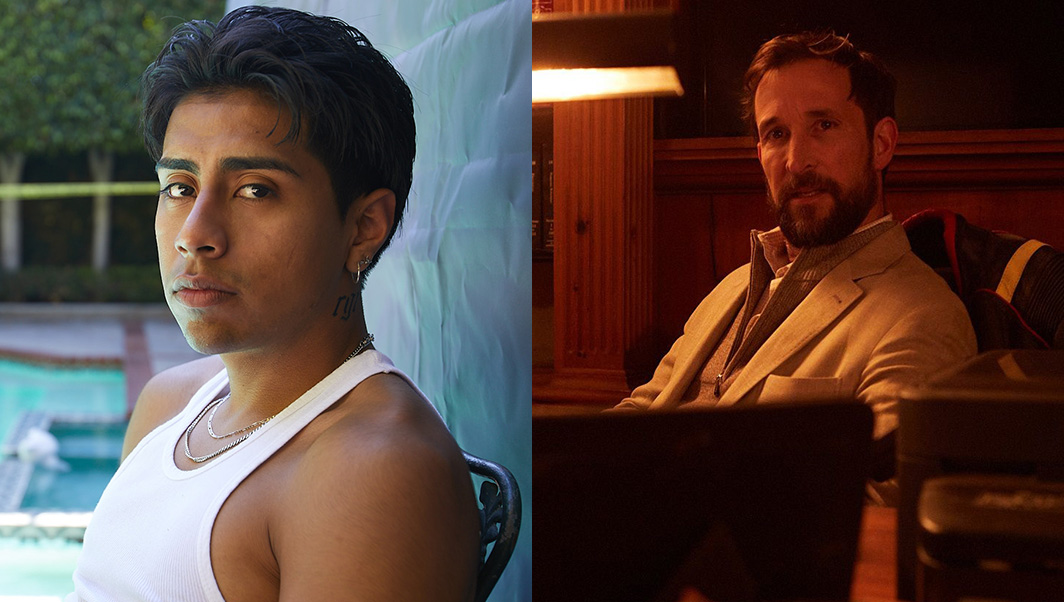Exclusive Interview: Ezekiel Pacheco and Noah Wyle Discuss Their Timely New Film, ‘At the Gates’


Ezekiel Pacheco and Noah Wyle are two of the stars of the timely new film, At the Gates.
Ana (Vanessa Benavente), a housekeeper from El Salvador, brings her teenage son Nico (Ezekiel Pacheco) to help her clean an affluent family’s Los Angeles home. But after someone rings the front gate, her employers, Marianne (Miranda Otto) and Peter Barris (Noah Wyle), inform them that immigration officers are searching for them and convince the pair to hide in a basement closet, demanding they hand over their cell phones as a safety precaution. As days go by under the same roof, each family begins to question the other’s true intentions in this riveting and emotional thriller.
Pop Culturalist was lucky enough to speak with Ezekiel and Noah about At the Gates, bringing their shared experiences to the project, how improvisation allowed them to connect to each other and the material, and more.
Please Note: At the Gates has been granted an interim agreement from SAG-AFTRA. Without the labor of actors currently on strike, the film being covered here wouldn’t exist.
PC: Ezekiel, this is a project and character that hit close to home for you. How were you able to bring both you and your family’s experiences to Nico? Is there a different weight/responsibility when you’re playing a character whose shared experiences are so similar to so many living in the U.S. today?
Ezekiel: Yeah, it was honestly pretty easy for me because I’ve been through many of the experiences that my character has gone through. But I also wanted to reflect and mirror that truth back to kids in L.A. and kids around the world who are going through this. I wanted to portray the true story of a mom and son and the adversities they have to go through. There’s a lot of love between Nico and Ana, and I wanted to reflect that truthfully. Being Latino in this industry, you don’t often see these relationships portrayed in a heartfelt way without stereotypes. I wanted to bring a truth that I think we were able to achieve.
PC: Noah, Auggie wrote and directed this film. You’ve also written and directed in the past. Is the filming experience different when the person who created these characters and narrative is also at the helm directing? How have your own experiences behind the camera impacted the way you approach your work on screen and interpret characters like Peter and his very nuanced journey throughout the film?
Noah: I don’t know if I can compare my own trajectory to Auggie’s because my experience played out differently. I’m so impressed with him because when I started writing and directing, I was very control-oriented. He is the opposite. He’s so collaborative and intent on creating an atmosphere for creativity without being dogmatic about his words or anything. It felt very free. It was a process that usually you get with a much more experienced director at the helm. My compliments to him for how seasoned a professional he comes across so early in his career.
But yes, it does make a difference when you have the author with a single vision who is able to articulate it as well as Auggie can. It gets everyone to buy into something very viscerally. He’s a terrific communicator. It makes it that much easier when you realize you’re helping somebody create a passion and realize that passion rather than just executing a job.
PC: Ezekiel, without giving any spoilers, there’s a really vulnerable moment between Nico and his mother towards the latter half of the film, which you brought so much depth to. How did you create the space for yourself to dive into that scene in particular? What was it like collaborating with Vanessa to bring that mother-son dynamic to life?
Ezekiel: That’s my favorite scene in the whole movie. I believe if you’re lucky to have your mom with you, you’ve had that conversation with her. You want to give your parents a better life. My mom is the apple of my eye, and so is Nico’s mom. Every man wants to give their parents a better life. I hope that it’s reflected in the audiences who see this, and they’re able to connect with that.
PC: Noah, time is never a luxury when you’re working on a feature. It’s even rarer that the cast has the opportunity to rehearse. What discoveries were made during that process? How did that allow you to build trust with your fellow castmates as you tackled this really sensitive and timely subject matter?
Noah: Sometimes when a script is written with sparse dialogue, almost Jacobean style, you have to fill in those blanks. You have to put in the life that isn’t there on the page. It has to be very three-dimensional. So that rehearsal process involved a lot of improvisation and working around the text and the situations we were dealing with to try and get as honest about how we would react as people in those situations as possible.
Out of that improvisation, a lot of really wonderful, nuanced moments came up that infused the film with a sense of weight and history to these relationships. You really believe these people are married. You believe that this is a family struggling with a lot of secrets and poor communication, but they are well-intentioned and going through a difficult time. You see that mirrored in both storylines, and when they collide, it’s almost like a car crash. Everybody has to figure it out, which feels very contemporary and necessary. It comes through this wonderful Trojan horse of a cool thriller. It doesn’t feel polemic; it’s really entertaining at the same time.
PC: Ezekiel, this is your feature film debut as a lead. Congratulations, by the way. What was the most surprising part about this experience? What was the biggest takeaway?
Ezekiel: Honestly, I’m really blessed that I was able to do this. I was working at Amazon when I got this role. Auggie wrote me a letter when he offered me the part. God was right the entire time. I’ve been envisioning this for so long that I wasn’t surprised. I’m very grateful and really blessed. But I’ve always believed that I was going to be a leading man in this industry and one of the best. I’m going to keep working hard, be disciplined, and learn from people like Noah, Auggie, Ed Harris, Shia LaBeouf, and all these people who have been teaching me for so long. I’m going to keep learning, keep my head down, and be one of the best.
PC: Noah, you’ve worked on projects of all sizes. What is it about independent filmmaking that excites you as a creative and a storyteller?
Noah: Well, oftentimes that’s where the most engaging and interesting stories are found these days. It’s very difficult to get financing for these types of movies, which is why you don’t see them very often. When they come across your desk and they’re written as well as this one, I look at it as a golden opportunity to go and hit the gymnasium, apply my trade, and do that work you rarely get to do in television or on bigger budget movies. It’s a chance to roll up my sleeves and try to stay relevant with the younger generation.
Make sure to follow Ezekiel (Twitter/Instagram) and Noah (Instagram). At the Gates is in select theaters in Los Angeles on 11/3 and in New York on 11/10.
Photo Credit: Beacon Pictures 2022
Recent Posts
Exclusive Interview: How The Parenting’s Dean Norris Took That Scene to the Next Level
Craig Johnson’s The Parenting delivers the perfect blend of horror and hilarity, turning a classic…
Exclusive Interview: Director Craig Johnson and Writer Kent Sublette on Balancing Horror, Comedy, and Heart in ‘The Parenting’
Meeting the in-laws is stressful enough—throw in a 400-year-old poltergeist, and things go completely off…
SXSW 2025: Florence Hunt and Rory Walton-Smith on ‘Mix Tape,’ First Love, and Their Artistic Process
First love is unforgettable. It leaves an imprint, shaping the way we see the world,…
SXSW 2025: Why ‘F*ckUps Anonymous’ Is More Than Just a Show—Joe Tierney, Katrina Whalen, Sarah Jeffery & Andrew Michael Fama on Giving a Voice to the Voiceless and the Power of Storytelling
Television has the power to do more than entertain—it can challenge, heal, and transform. Some…
SXSW 2025: Siobhan McCarthy, Misha Osherovich, and Nico Carney on Reclaiming Comedy Classics with Trans Inclusion in ‘She’s the He’
Comedy classics like Mean Girls, She’s the Man, and Clueless have shaped generations with their…
Daring, Unpredictable, and Unforgettable: Tyler Cornack’s ‘Mermaid’ Dives into SXSW 2025 with Stars Johnny Pemberton and Avery Potemri
To say Tyler Cornack is a visionary would be an understatement. His fearless approach to…


